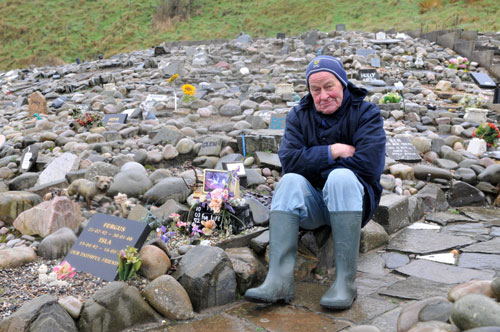A PET cemetery in the north of Scotland is proving so popular one woman drove 500 miles to bury her deep-frozen dead cat.
The beach site in the Moray fishing village of Cullen has been growing for 22 years since former binman Stephen Findlay buried the local doctor’s dog.
The cemetery has grown almost to the size of a football pitch and is the resting place of hundreds of beloved dogs, cats, rabbits – and a dolphin.

Mr Findlay, 85, the creator and caretaker of the pet cemetery, digs the graves and keeps them tidy.
He revealed: “The furthest a pet has traveled is from Birmingham.
“It was a cat owned by a policewoman who lived there but was originally from here.
“Her cat was run over.
“She kept it in a bag in the freezer until she could bring it up.”
Visitors to Cullen Beach are met with the spectacular sight of hundreds of rows of graves adorned with flowers, plaques, pebbles and even life-size stone ornaments of dead pets.
Mr Findlay said: “People just phone up and I ask what animal they want burying.
“Then I’ll go to the beach, dig a wee hole and we put the animal in.
“Most of the animals are local and I sometimes get small boxes of ashes to scatter.
“We also had a minister up here once who stood too close to the edge of the hole and fell in. I did warn him.”

Although the pet cemetery has grown to enormous proportions since the first, spontaneous burial in 1992, Mr Findlay is still not worried about running out of space.
He now predicts that he will be “dead himself” before that happens.
“I don’t know why I do it,” he said. “It’s just a hobby. People always say they are grateful.”
Mr Findlay long ago expanded his burial service to deceased marine mammals washed up on the coast of the Moray Firth.
As well as a dolphin and a seal – posthumously renamed “Sammy” – the cemetery is the final resting place of a porpoise.
“I took the porpoise up on a wheelbarrow,” said Mr Findlay. “It was a harbour porpoise. These aren’t very big so that’s why it was possible.
“Sammy the seal got washed in on a storm. He was on top of a rock, dead. I said, ‘I cannae help you’. The next day I came up and buried him here.”
Susan Morrison is the local doctor whose Spaniel Ben was the very first animal buried on the beach. Another two of her pets, Skye and Corrie, have since joined him.
The 68-year-old from Cullen said: “When Ben died we wanted to bury him but we couldn’t do it in the garden – there wasn’t enough room.
“I asked Stevie, who worked as a binman at the time, if he could help us bury the dog somewhere.
“He buried him down at the beach. We got Ben a big headstone with his paw print on it.
“We never expected it to take off like this – people come from all over and ask if they can have their animals laid to rest there.
“I’ve now had several pets buried at the cemetery. We used to walk the dogs down there and it’s a comfort to know they are buried close to us.
“The cemetery has become Stevie’s life. He’s a tremendous asset to the community. He always keeps it so tidy and well kept.”
June Stewart, 64, from Aberdeen, likes to walk her dogs along the cemetery path. She said: “It’s lovely. It’s a nice place for people to go. Most people don’t have anywhere to bury their dogs and it’s nice for people to walk around.
“It’s not odd at all – it’s lovely. Pets are such a precious thing.”
And Tanya Gray, manager of Bounds Petcare Centre just out of Cullen, said: “I think it’s really nice – it’s neat and always tidy. He’s always down there picking up rubbish and maintaining it.”
Mollie Moon, chairwoman of Cullen and Deskford Community Council said the cemetery was “a wonderful idea”.
“In this area not many people have gardens and so it means they have somewhere close that their pets can be buried. It is beautifully tended by Stevie and is much appreciated by everyone.
“It’s probably safer than people burying pets in their gardens because Stevie does the job properly and makes sure they are buried deep enough. The beach isn’t an area where foxes are going to come so there isn’t the worry of animals being dug up.”
The cemetery land is on an estate owned by the Seafield family. A spokesman said: “we agreed to him using the land for a cemetery. We have no issue with it at all.”
The village specialised in the export of smoked haddock, a key ingredient in Cullen Skink, the thick soup which made the community’s name famous.

